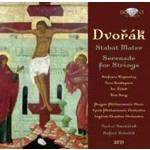
Stabat Mater / Serenade for Strings
 $25.00
Out of Stock
$25.00
Out of Stock6+ weeks add to cart
DVORAK
Stabat Mater / Serenade for Strings
Stefania Woytowicz (soprano), Vera Soukupová (alto), Ivo Zídek (tenor) Kim Borg (bass) / Czech Philharmonic Orchestra, Vaclav Smetácek
[ Brilliant Classics / 2 CD ]
Release Date: Friday 10 December 2010
This item is currently out of stock. It may take 6 or more weeks to obtain from when you place your order as this is a specialist product.
"Kubelik does the [Serenade] very beautifully."
(Gramophone)
Dvorák, like Bruckner was a devout Catholic. However, unlike Bruckner Dvorák did not have to compose religious music for church occasions. And, unlike the turbulent life led by the catholic convert Mahler, his life was one of domestic stability and happiness - if occasionally afflicted by periods of terrible grief and loss. It was the death of his daughter in 1876 (she was just two days old) that co-incided with the composition of the Stabat Mater. The text dating from the 13th century depicts Mary at the foot of the Cross, mourning her son. Dvorák worked on the score for several years, during which all Dvorák's remaining children tragically died. Otaker aged 3, and his other daughter Ruzena aged just 1 year. The Stabat Mater displays Dvorák's knowledge of the oratorios of both Handel and Mendelssohn, and the work met with success at home and in the UK where he conducted the British premiere in 1883.
The Serenade Op.22 for strings is one of his most popular works, and dates from 1875. The work is full of dance rhythms and in the slower movements an introverted passion with a melancholic character. The long melodic lines show that no matter how hard Dvorák tried to shake off the influence of Wagner (his Third and Fourth Symphonies are heavily Wagnerian in places) the Bayreuth master still cast his shadow over the mature Dvorák.
New booklet notes and sung texts.
Tracks:
Stabat Mater, Op. 58
Serenade for Strings in E major, Op. 22
(with English Chamber Orchestra, Rafael Kubelík)



